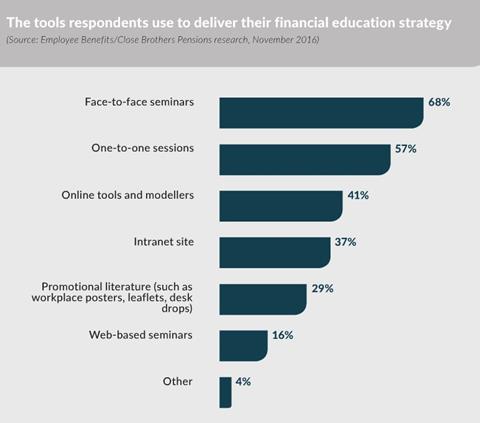
Need to know:
- Unsecured debt in UK households is at a record high.
- A financial education programme to address sensitive financial issues should incorporate all benefits, including employee assistance programmes (EAPs) and retail discounts.
- Employers can use a range of communication methods, but they must assure employees that they can discuss sensitive subjects confidentially.
Discussing an employee’s personal financial issues in the workplace is a subject hesitantly approached at best; for the employee, they need to have some assurance that any problems will be treated with the greatest confidentiality, and that opening up during a discussion will have no bearing on their role and responsibilities or their future at the organisation.
Darren Laverty, partner at Secondsight, says: “There are two taboos in the workplace at the moment: mental health problems and financial problems. [Employees] are reluctant to talk about them so they need to feel there is some confidentiality about the whole thing.”
There are also notable differences between the generations, says Katie Vye, senior Money at Work consultant at Jelf Employee Benefits. “Times have changed; previously, [people] weren’t comfortable discussing the subject of money in general,” she says. "That’s very much a generational thing. In my experience, younger employees, especially [the] millennial generation, are very open to talking about their finances and I think that derives from the fact that we have a very debt-ridden society now.”
Financial issues
The issues that affect employees are wide ranging. Nudge Global’s Financial education yearbook 2017, due to be published in early 2017, found that one of the most common type of support employees ask for is around retirement planning. Tim Perkins, director at Nudge Global, says: “Fifteen years ago, it was just about [employees] making sure they were making the most of what was on offer and they didn’t necessarily need to worry so much about what their employer was doing for them, but now the conversations around retirement are more sensitive, it’s more: ‘Am I going to have enough, am I going to be able to retire?’”
Debt management is a key financial issue that is increasing in precedence. PricewaterhouseCooper’s UK consumer credit outlook report, published in November 2016, found that unsecured debt in the UK reached an all-time high of £270 billion in 2016. Credit card, overdraft and personal loan debt stands at the equivalent of close to £10,000 per UK household. “The other thing we’re starting to see is significant student debt,” says Laverty. “It’s not unusual to talk to young people who have already got £50,000 or £60,000 worth of debt to deal with before they can move on in life.”
The emotional attachment to a debt situation can be used to the employee’s advantage through financial education, says Laverty. “If [employees] are feeling emotionally bad about the debt situation, [financial education programmes can] capture that feeling and use that as the motivation, the driver to solve the problem. [Employees will] remember that pain and they’ll never want to [feel] that again, and that can serve them forever.”
The employer’s role
Discussing such issues in a work setting may seem an uncomfortable concept for many employees, and for employers, sensitivity is just as important. Nudge Global's research found that confidentiality is key in the provision of a financial education support mechanism for 77% of employers. The research also found that 84% of employers said they have a role to play in helping employees with sensitive financial matters.
Heidi Allen, head of insights and engagement at Neyber, says: “The employer is, in the vast majority of cases, the primary source of income, and there comes with that an inherent sense of responsibility. Although it is not the employer’s responsibility to say ‘this is what you need to do’, it is its responsibility to have open conversations. The fact that it provides the income but doesn't provide the emotional or support elements that go alongside providing a large amount of money each week or month is really quite sad.”
However, the line of responsibility should be made quite clear, says Jeanette Makings, head of financial education at Close Brothers Asset Management. Many employers will feel that it is not their place to address such personal issues. “Financial wellbeing is obviously a big topic and everyone recognises that worrying about money actually does affect physical and mental wellbeing, as well as engagement and productivity in the workplace,” she says. “But in terms of staff actually divulging personal information in the workplace, I’m not sure many employers want that. I think they want staff to know of the benefits and the support available should they need it, but I’m not sure they would want employees to tell them about their problems.”
An effective financial education strategy that supports an employee’s sensitive financial situation should incorporate every benefit available in an organisation. “It should help those who are struggling with budgeting and managing debts, it should signpost the fact that [the employer has] say, a workplace loan available, or if it has an employee assistance programme (EAP) or debt counselling and get routed through to debt charities,” says Makings. “Financial education would always reference that, and also things such as childcare vouchers, retail discounts, coupons, and telling people not to borrow from payday lenders or use their credit cards, those sorts of things.”
Engaging communications
Issues such as debt counselling, debt consolidation and the related support available can be addressed in wider financial education presentations and workshops. Employees can then be offered the opportunity to follow up on a more personal basis in a one-to-one meeting, or even to watch a webcast in private.
This is where an employer might encounter reluctance from employees to open up about sensitive issues, so a careful approach is needed. Addressing problems such as debt in a workshop environment might not have the desired effect or take-up rate because there is not that level of privacy, says Laverty. It can be more effective to run general financial education workshops and seminars, and signpost employees to sources of information.
“If we talk about financial education and having control of finances, there’s a number of subjects we cover,” says Laverty. “Then we tell [employees] that there’s debt [information] and they can privately register to get involved online and it’s dealt with discreetly. [We] can’t tell the employer who’s doing what, but the employer can rest in the knowledge that there’s an easy way to reach out to people. We’ve got to avoid [employees] putting a guard up, and be gentle and nudge them into the right place. It’s a stepping-stone approach.”
Key to engaging employees with financial education is ensuring that from day one of its launch it has clear messages about the organisation’s strategy behind the programme. “Set the context about why the organisation is doing this,” says Nudge Global’s Perkins. “It might be that there have been employees that have had trouble, it might be a very public [corporate and social responsibility] CSR agenda. It might be that as part of a global wellbeing focus [the employer] wants to support people.”
Additionally, it is important that employers emphasise the independence and confidentiality of a financial education programme. “Where employers are introducing a programme that doesn’t [sell products], where it is independent and there’s no pressure on employees to take a product, that’s a strong positive, inclusive message to go out to people with,” says Perkins.
Employers have a role to play in creating a positive message around the importance of financial education and communicating that, if needed, further confidential support is available for employees.

Admiral Group provides tools to help staff manage financial concerns
Insurance group Admiral offers its employees financial education through its Ministry of Money programme.
The Ministry of Money, represented by a green pig, is designed to be a humorous way to get more serious messages across to the workforce. Admiral also runs a Ministry of Health to focus on health and wellbeing, and a Ministry of Fun, which organises events across the organisation.
Admiral works with Jelf Employee Benefits to provide financial wellbeing presentations to employees on subjects including pensions, ‘know your benefits’, and approaching retirement. Admiral also distributed a spending diary to help employees manage their daily spending.
Admiral also offers two savings schemes that evolved from a Christmas savings club. It partnered with Cardiff and Vale Credit Union and Barclays to give employees the opportunity to save with either scheme through payroll, and have access to their savings at any point in the year. Additionally, the employer pays for initial advice from an onsite financial adviser on any issue other than pensions, and a legal clinic once a month.
Richard Thorne, head of HR policy and complex case management at Admiral Group, says: “The idea of doing [this] is to let people make their plans in work time so they’re not distracted from their job. If something’s on site, it’s easy to get to, there are no physical barriers to getting there. It means that people can hopefully alleviate their concerns as quickly as possible.
"We try to offer as many routes as possible to people to try and promote their financial wellbeing and planning.
“Even if people present to work, if they’ve got worries about money on their mind, they will be distracted from doing a good job, so it’s our job to try and make it as easy as possible for them. We can’t fix their financial worries for them, that is their responsibility, but the more tools we can put into the toolkit for them to choose from to either get out of trouble, prevent it from happening or make the right choices is better for us.”

Viewpoint: The case for considering employees’ financial wellbeing is compelling
Significant proportions of employees are facing increasing financial challenges. For example, demographic and policy changes, rising education and housing costs, an ageing population and rising state pension age, mean that the financial pressures facing employees are only likely to intensify over the coming years.
But why should employers be concerned if their employees are experiencing financial pressures? Well, in a nutshell, because poor employee financial wellbeing will ultimately impact upon an organisation’s bottom line. There is a wealth of evidence indicating that poor financial wellbeing impacts on health in terms of poor psychological wellbeing, higher stress and anxiety levels, and lower levels of good health. This, in turn, impacts productivity in terms of poorer job performance, reduced concentration, lower productivity and absenteeism. This provides a compelling case for employers to consider the financial health of their workforce and to reflect on their responsibilities and opportunities.
There is no one perfect solution to poor employee financial wellbeing. However, a good starting point for support would be to identify the needs of employees. [Employers could] consider segmenting the workforce by generation or income level in order to target relevant financial information based on their likely financial pressures. Also, if an employee is going through a significant life event, for example, marriage or the birth of a child, this can be used as an opportunity to target financial information to remind them to examine their changing needs and priorities. Communications can be refreshed about the benefits already on offer to employees that may help them save money and reduce spending. Or [an employer can] simply provide introductory links to external sources of help, such as charities that offer debt advice and assistance.
Overall, by supporting employees’ financial wellbeing [an organisation is] demonstrating that [it is] a responsible and supportive employer, which can increase engagement and employee willingness to go the extra mile.
Catherine Rickard is senior research fellow at the Institute for Employment Studies

















